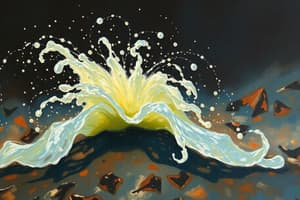Podcast
Questions and Answers
A book rests on a table. Which force primarily prevents the book from moving horizontally without any external push?
A book rests on a table. Which force primarily prevents the book from moving horizontally without any external push?
- Sliding friction
- Gravitational force
- Fluid friction
- Static friction (correct)
Considering the factors that influence gravitational force, how would doubling the mass of both objects affect the gravitational force between them, assuming the distance remains constant?
Considering the factors that influence gravitational force, how would doubling the mass of both objects affect the gravitational force between them, assuming the distance remains constant?
- It would be reduced to one-quarter.
- It would quadruple. (correct)
- It would double.
- It would be reduced by half.
In which scenario is fluid friction the MOST significant factor affecting the motion of an object?
In which scenario is fluid friction the MOST significant factor affecting the motion of an object?
- A box being pushed across a concrete floor.
- A submarine moving through water. (correct)
- A car driving on a dry asphalt road.
- A hockey puck sliding across an ice rink.
If an astronaut with a mass of 55kg on Earth travels to a planet with lower gravitational acceleration, which of the following would remain the SAME?
If an astronaut with a mass of 55kg on Earth travels to a planet with lower gravitational acceleration, which of the following would remain the SAME?
Which of the following is an example of a non-contact force?
Which of the following is an example of a non-contact force?
A car is moving at a constant velocity. What can be said about the forces acting on the car?
A car is moving at a constant velocity. What can be said about the forces acting on the car?
As the distance between two objects increases, what happens to the gravitational force between them?
As the distance between two objects increases, what happens to the gravitational force between them?
Which of the following scenarios BEST exemplifies sliding friction?
Which of the following scenarios BEST exemplifies sliding friction?
Flashcards
Force
Force
A push or a pull on an object, measured in newtons (N).
Contact Force
Contact Force
A push or pull resulting from direct contact between objects.
Non-Contact Force
Non-Contact Force
A push or pull between objects without direct contact.
Friction
Friction
Signup and view all the flashcards
Static Friction
Static Friction
Signup and view all the flashcards
Sliding Friction
Sliding Friction
Signup and view all the flashcards
Fluid Friction
Fluid Friction
Signup and view all the flashcards
Gravity
Gravity
Signup and view all the flashcards
Study Notes
- Forces are covered in Chapters 2, 19, and 20, alongside supplementary material focusing on Electric, Magnetic, and Gravitational Forces.
- How forces change the motion of an object is a key concept.
Gravity and Friction
- Key questions address contact and non-contact forces, universal gravitation, and friction's effect on sliding objects.
Types of Forces
- A force involves a push or pull on an object and are measured in newtons (N).
- Contact forces involve one object touching another.
- Pushing a container, pressing computer keys and friction serve as examples of contact forces.
- Non-contact force acts between objects that are not touching.
- Gravity, magnetic and electrical forces are examples of non-contact forces.
Friction
- Friction resists the motion of two touching objects.
- Static friction prevents objects from sliding past each other.
- Sliding friction opposes the motion of objects sliding past each other.
- Fluid friction occurs between a surface and a fluid, like water or air.
Static vs Sliding Friction
- Includes images to indicate the relevant forces in action.
Gravity
- Gravity is an attractive force between all objects with mass.
- The greater the mass, the more gravitational pull is exerted.
- The greater the distance, the less gravitational pull is exerted.
Weight vs Mass
- An astronaut weighing 539N and having a mass of 55kg on Earth would experience a change in weight if she were on the moon, according to (F=ma).
- Weight would be less.
Electrical Force
- Static charge: imbalance positive or negative charge on an object
- Opposite charges attract each other.
- Similar charges repel each other.
- Electric charge magnitude affects electric force.
- Distance affects electric force as greater distance leads to less electric force.
Magnetic Force
- Magnet: objects that attract metal iron
- Magnetic pole: place on a magnet where the force it apple is the strongest
- Opposite poles (or charges) attract each other, while like poles (or charges) repel each other.
- Magnetic strength is affected by magnet size.
- Greater distance between magnets leads to weaker magnetic force.
Studying That Suits You
Use AI to generate personalized quizzes and flashcards to suit your learning preferences.
Related Documents
Description
Explore forces, motion, and their measurement in newtons. Learn about contact and non-contact forces like gravity, magnetism, and electricity. Understand different types of friction, including static, sliding, and fluid friction, and their effects on objects.




